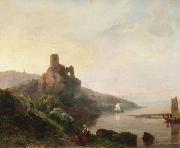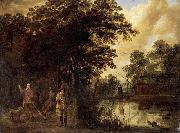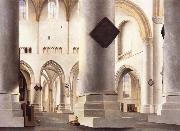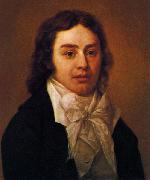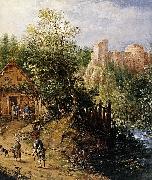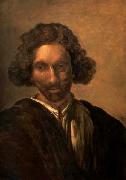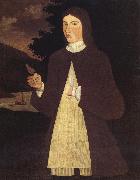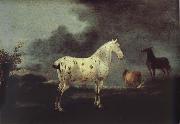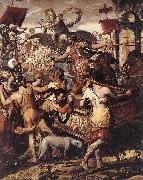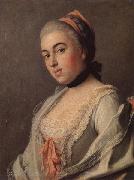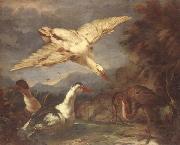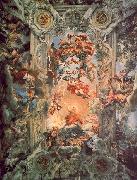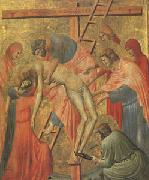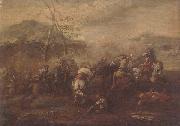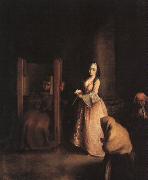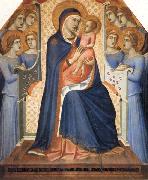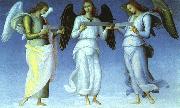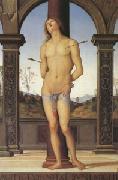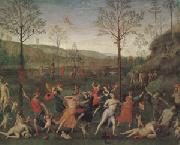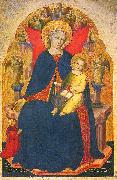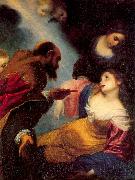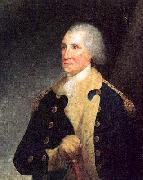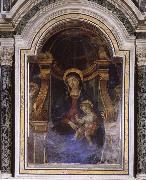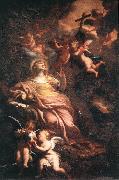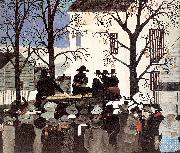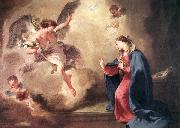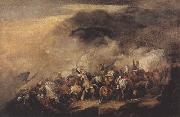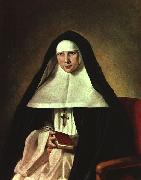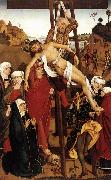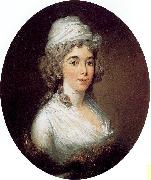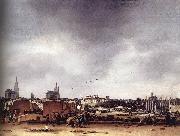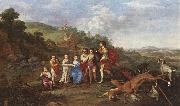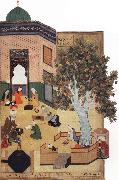|
|
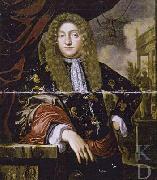 |
Pieter Leermans
|
|
Pieter Leermans (ca.1635, Leiden - 1706), was a Dutch Golden Age painter.
he was a portrait painter of historical allegories. He is also known as Lieremans
Little is known of his life, but he is considered to be one of the Leiden fijnschilders
|
|
|
|
|
|
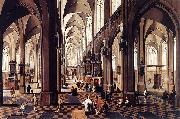 |
Pieter Neefs
|
|
(also Neefs; 23 May 1620-after 1675) was a Flemish Baroque painter who specialized in architectural interiors of churches.Born and active in Antwerp, he was trained by his father, Pieter Neeffs I.Their works, in fact, are very similar and attributions of their individual hands can be difficult. His brother Ludovicus Neefs has also made similar paintings. |
|
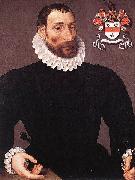 |
Pieter Pourbus
|
|
(1523 - 30 January 1584) was a Dutch-born Flemish Renaissance painter.
Remi Ommejaghere and his three sons
Onze-Lieve-Vrouwekerk, Bruges, BelgiumPourbus was born in Gouda. He was known primarily for his religious and portrait painting and worked mainly in Bruges, where he had moved from Gouda by 1543. He died in Bruges. His son was the painter Frans Pourbus the Elder and his grandson was Frans Pourbus the younger
|
|
|
|
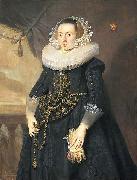 |
Pieter Soutman
|
|
(1593-1601 - 16 August 1657) was a Dutch Golden Age painter and printmaker from Haarlem.
|
|
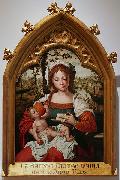 |
Pieter van Aelst
|
|
(August 14, 1502 - December 6, 1550) was a Flemish painter. He studied under Bernaert van Orley and later lived in Italy before entering the Antwerp Guild of painters in 1527. In 1533, he travelled to Constantinople for one year in a failed attempt to establish business connections for his tapestry works. Van Aelst established a studio in Brussels in 1544, where he created paintings and tapestries. His students include Gillis van Coninxloo, Willem Key, Hans Vredeman de Vries, Michiel Coxcie, and possibly Pieter Brueghel the Elder, who did eventually marry van Aelst's daughter, Mayken. His second wife, Mayken Verhulst, was an artist as well, and, according to Carel van Mander, the first teacher of her grandchildren, Pieter Brueghel the Younger and Jan Brueghel the Elder. He was also the uncle of Joachim Bueckelaer. Van Aelst's studio is also well known for its engraved works.
In particular, van Aelst is noted for his 1539 translation of Sebastiano Serlio's architectural treatise, Architettura, which is credited with having played a crucial role in spreading Renaissance ideas to the Low Countries and hastening the transition from the late Gothic style prevalent in the area at the time. He was in charge of the spectacular decorations for the 1549 Royal entry into Antwerp of Philip II of Spain, "the most famous entry of the century", according to Roy Strong.
|
|
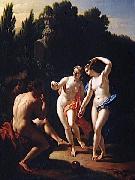 |
Pieter van der Werff
|
|
(1665 - September 26, 1722) was a Dutch Golden Age painter. He assisted his older brother, Adriaen van der Werff.
He learned to paint from his brother Adriaen and according to the RKD, he spent most of his life working in Rotterdam, where he painted the rich and famous |
|
|
|
|
|
|
|
|
|
|
|
|
|
|
|
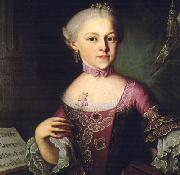 |
Pietro Antonio Lorenzoni
|
|
Pietro Antonio Lorenzoni (1721 - 1782) was an Italian painter who is believed to have painted several portraits of Wolfgang Amadeus Mozart and his family: "The Boy Mozart" (1763), his sister Maria Anna Mozart in "Nannerl as a Child" (1763) and a portrait of their father Leopold Mozart (c. 1765). He arrived in Salzburg, Austria in the 1740s and first wanted to paint Wolfgang and Nannerl. His protege, Johann Nepomuk della Croce, painted a Mozart family portrait in 1780. |
|
|
|
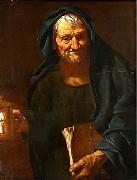 |
Pietro Bellotti
|
|
(1625-1700) was an Italian painter active in the Baroque period. He was born in Sale. He was a pupil of Michele Ferrabosco in Venice. He was patronized by Pope Alexander VIII and by the Duke of Uceda. He lived in Bolzano[1]. He painted mostly portraits. He died at Venice.
|
|
|
|
|
|
|
|
 |
Pietro della Vecchia
|
|
(1603 - 8 September 1678) was an Italian painter also known as Pietro Muttoni. Born in Vicenza (Venice), he likely trained with Alessandro Varotari, called Padovanino, deriving a notable interest in Venetian masters such as Titian and Giorgione. Until 1984, he was mistakenly referred to as Pietro Muttoni. This misnomer is attributed to Italian art historian and archaeologist, Luigi Lanzi (June 14, 1732 - 30 March 1810), who in his Storia pittorica della Italia confused the name of the artist with the name of a collection, Muttoni, in which he had seen one of his paintings. In fact, Pietro was from the well known Venetian family, the della Vecchia. Renowned among his contemporaries for his ability to imitate the styles of 16th-century masters, he was also known for his grotesque paintings and portraiture. His earliest known works, two representations of St Francis, which have survived in many versions (e.g. Modena, Gal. Estense; Rovigo, Accad. Concordi), and a Crucifixion (1633; Venice, S Lio) are so heavily influenced by Carlo Saraceni and his student and collaborator Jean Leclerc as to suggest that della Vecchia trained with them. Certain Caravaggesque elements, which remained in his work for some time to come, suggest that he spent some time in Rome after Leclerc had left Venice, in 1621 or 1622. The influence of Alessandro Varotari or Padovanino, who is described by sources (e.g. Orlandini) as della Vecchia's teacher, is only noticeable in dated works from 1635 onwards. Della Vecchia probably worked in Padovanino's studio c. 1625-6, after his trip to Rome, and from the latter he derived his great interest in 16th-century painting in Venice and the Veneto. His monumental Crucifixion (1637; Venice, Fond. Cini), in which the composition harks back to the 16th century while the figures derive from Caravaggio, is characteristic of this phase. Around 1640 the influence of Bernardo Strozzi is apparent in his work, as in the Angel Offering a Skull to St Giustina, who stands between St Joseph and St John (1640; Venice, Accad.), painted for the church of S Giustina. In 1640 he began to design cartoons for the mosaics in S Marco, on which he worked until 1673. From 1640 to 1673 he was commissioned from the Venetian Republic for the design of the mosaic cartoons for the St. Mark's Basilica. He painted four idyllic landscapes that presage some of the Rococo content (now in Pinacoteca Querini-Stampalia). He married Clorinda Renieri, daughter of Nicolas Regnier, Flemish painter and art dealer. Della Vecchia died in Venice, September 1678.
|
|
|
|
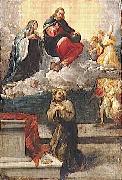 |
Pietro Faccini
|
|
(1562 - 1602 or 1614), was an Italian painter, active near his birthplace of Bologna in styles bridging Mannerism and the nascent Baroque.
According to Malvasia, the main biographer of the early Bolognese Baroque, he apprenticed in his twenties with the with Ludovico and Annibale Carracci. His style departs from the linear "Roman" quality assumed by his mentor, and has a more sparkling quality, influenced by Tintoretto, Correggio, and Bassano. His documented painterly output consists of about a dozen works. In 1590, he painted the Martyrdom of Saint Lawrence, now found in the church of San Giovanni in Monte (Bologna). He completed altarpieces for San Domenico and Santa Maria dei Servi in 1593-1594 and a Presepio in the Pinacoteca of Bologna. |
|
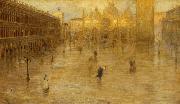 |
Pietro Fragiacomo
|
|
(Pirano deIstria (Trieste), 1856 - Venice, 1922) was an Italian painter.
Born at Pirano deIstria near Trieste, Fragiacomo moved with his family to Venice, where he enrolled at the Academy of Fine Arts in 1878 after a period as a worker in Treviso. He then abandoned his studies barely one year later to devote himself more freely to painting from life, often in the company of his friend the painter Giacomo Favretto. He won a bronze medal at the Universal Exhibition of 1889 in Paris and took part in the Munich International Exhibition of the same year, as well as later editions. Drawing inspiration from the Venetian lagoon and always characterised by a crepuscular sense of nature, his landscapes took on Symbolist overtones at the end of the century. He won the Prince Umberto Prize at the Milan Triennale of 1891 and was a regular participant from 1895 to 1922 at the Venice Biennale, which held a solo show of his work in 1910 and a posthumous retrospective in 1924.
|
|
|
|
|
|
|
|
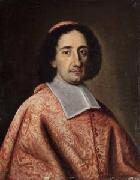 |
Pietro Paolo Vegli
|
|
Pietro Paolo Vegli - Ritratto Del Cardinale Francesco Maidalchini (1621 - 1700)
|
|
|
|
|
|
|
|
|
|
|
|
|
|
|
|
|
|
|
|
Piotr Michałowski
|
|
(July 2, 1800 - June 9, 1855) was a Polish painter of the Romantic period, especially known for his many portraits.
His talent was long underestimated, but he was re-discovered by Pablo Picasso in 1948. When the painter visited Poland, he saw Michałowski's work in the Warsaw National Museum and shouted, "Here, painter!"
The Sukiennice Museum, a division of the National Museum in Krakew, contains a room devoted to Michałowski's work.
|
|
|
|
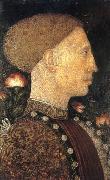 |
PISANELLO
|
|
Italian painter (b. 1395, Pisa, d. 1455, Roma). |
|
|
|
|
|
|
|
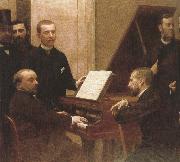 |
plato
|
|
Born: c. 428 B.C.
Birthplace: Athens, Greece
Died: 347 B.C.
Best Known As: The ancient philosopher who wrote The Republic |
|
|
|
|
|
|
|
|
|
|
|








